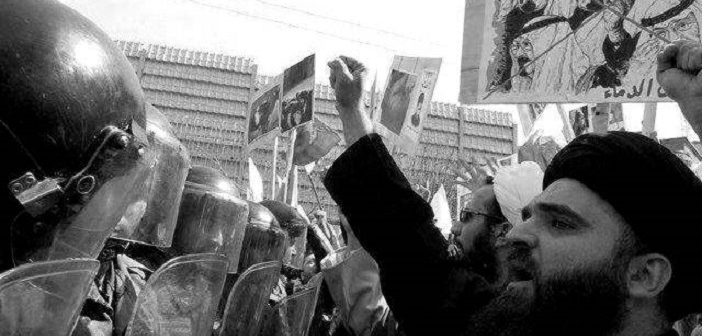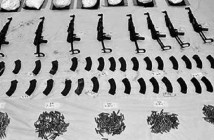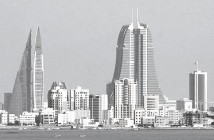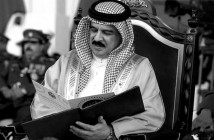What happens in Bahrain? Do a tyrannical minority rule, under an unjust monarchy, or are foreign powers meddling within another country?
The crackdown on the opposition in Bahrain has drastically intensified throughout the summer and spring of this year, and now the country is experiencing radical turmoil in its political landscape. The strategically important island just off the coast of Qatar, Saudi-Arabia and not far from Iran is home to the United States’ Fifth Fleet with some 8,000 personnel, and recently reopened a military base for the UK.
Bahrain was home to many protests against the government during the Arab Spring, which were over whelmingly perpetrated by the Shia majority who took to the streets questioning the minority authoritarian rule of the Sunni King Hamad bin Isa Al Khalifa. The members of the house of Khalifa, the Bahrain Royal Family, head all key posts in the government such as the Minister of Interior, Foreign Affairs, Finance, and Justice. The prime minister for the last forty-five years has been the uncle of the king. Apart from the discrimination in the government, Shiites are prohibited from joining the police force and military which is reserved for Sunnis only, but not solely Bahrainis. Yemeni, Syrian, and Pakistani Sunnis are all allowed into law enforcement, and some of them are given citizenship so that what has in the past been a clear Shiite majority is evening out.
The discrimination against the Shiites is only one part of the current crisis. The bad economic performance since the financial meltdown of 2008 is another reason for concern as the GDP/capita has only very slightly increased since 2008.
The economic and societal problems Bahrain are experiencing are two major reasons why the so called Arab Spring finally reached the island in 2011. The turbulences ignited by the Shiite majority and supported by their most important political group the al-Wefaq were dispersed by Saudi and UAE security personnel who were invited by the King. The Bahraini equivalent of Tahrir square in Cairo, the “Pearl Roundabout”, was finally cleared by the security forces and subsequently renamed to Al Farooq Junction which is a clear reference to a historical Sunni figure who is revered for fighting Shiites.
All though the period of the Arab Spring is behind, turbulences haven’t left Bahrain. Clashes between protestors and police are regularly taking place in the villages surrounding the capital, since protests are forbidden in Manama. The throwing of rocks, Molotov cocktails, upon which the security forces respond with firing of tear gas and handing out jail sentences has been a weekly routine since 2011. Another tactic of repression by the government is stripping the nationality of citizens who post offensive tweets against not only the Bahraini King but the Saudi King as well, a clear violation of freedom of expression.
The harassment of the opposition groups and its leaders are the main reason driving the protests, which have become more and more frequent since February. Al-Wefaq, which is the biggest political society (parties are banned) in the National Assembly had 18 seats out of 40 before all of its members resigned in 2011 because of the encroachment of the security forces. The group didn’t run in 2014, boycotting the general election, and the drawing of the electoral boundaries, which basically makes it impossible for al-Wefaq to win the majority of the forty constituencies, even though it is by far the biggest political society in the country. This predominately Shiite group has a policy calling for reform, change in governmental policy, a constitutional monarchy and the curbing of the powers of the King. The Secretary-General of the party, Ali Salman had his prison sentence extended from four to nine years in May (a day after the inauguration of the British base) for “anti-national activities”. Ali Salman had a prominent role in the uprising of the 1990s, and is a key member in the opposition. The government is trying to further curve the influence of al-Wefaq by going after its other leaders as well. A law passed in 2016 prohibits clerics (both Sunni and Shia) to have positions in “political societies”. In this way the government essentially side-lined both Sheikh Salman but also the spiritual leader of the party, Ayatollah Sheikh Isa Qassim.
The government drastically escalated the oppression of the opposition later in June. First the prominent and influential Bahraini human rights activist Nabeel Rajab was arrested for “spreading false news”. Then his colleague Zainab al-Khawaya moved to Denmark after finally being released from prison. The regime also gave travel bans to some opposition members because of their intent to attend a session of the UN Human Rights Council.
The day after the arrest of Rajab, al-Wefaq suffered another setback as the government suspended all activities of the opposition group with its assets being frozen. The official reason for this, according to the regime, was because the group provided “nourishing environment for terrorism, extremism and violence” but in reality the regime’s goal was to harass, weaken and politically side-line the opposition.
The Persian link is often brought up by the government which regularly blames Iran for the turbulences in the country. Roadside bombs have killed several policemen, and sometimes civilians, as happened late June when a woman died and another passer-by got injured. Responsibility for these attacks lie with the several Shiite Jihadist militant groups operating in Bahrain like Saraya al-Karar and Saraya al-Mukhtar, which are according to the government trained and equipped by the IRGC and Hezbollah.
To give a sense of the level of persecution of the citizens who openly oppose the rule of King Hamad bin Isa Al Khalifa it is enough to look at the previously mentioned case of Zainab. She is the daughter of a prominent human rights activist, and gained fame during and after the 2011 protests for her bravery for standing up against the regime. Being imprisoned several times, her latest sentence this spring – together with her toddler child –was given for ripping a picture of the Bahraini ruler King Hamad. That didn’t help her case as she was handed a three-year prison sentence for insulting the King. With some back channelling by the Secretary of State John Kerry, she only served half a year, being eventually released along with her child in May. She eventually relocated to Denmark.
It did not stop there. Just the week after, the government turned its eyes towards the spiritual leader of the group Sheikh Isa Qassim who they first claimed was involved in suspected money-laundering. Five days later he was stripped of his citizenship. This seemed to be the last straw for neighbouring Iran which has long supported the Shias in Bahrain. First on June 16th, Ayatollah Khamenei called the Kingdom as a “tyrannical and foolish rule of an arrogant and selfish minority over a big majority”. Then the Iranian Revolutionary Guards commander Qassem Suleimani, who heads multiple Iranian covert operations around the Middle-East commented as well. The general said that a “red line” has been crossed, the “bloodthirsty regime will be toppled” and there is “no path but armed resistance”. This threat played straight into the hands of the Bahraini regime, which could now say that the demonstrations that are taking place are orchestrated and supported directly be the leadership of its rival, Iran.
All of this threatens the rich religious diversity and secularity of the country to which the King and Bahrainis have greatly contributed to. Contrary to many Arab countries, in Bahrain there are Hindu temples, churches and there is a Jewish member of the parliament.
But if the clamp on the opposition continues, it can either escalate tensions between the Sunnis and Shiites or with many of the leaders of the opposition gone, return to the status quo.





